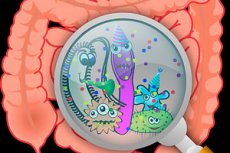Intestinal microflora improves brain function
Last reviewed: 16.10.2021

All iLive content is medically reviewed or fact checked to ensure as much factual accuracy as possible.
We have strict sourcing guidelines and only link to reputable media sites, academic research institutions and, whenever possible, medically peer reviewed studies. Note that the numbers in parentheses ([1], [2], etc.) are clickable links to these studies.
If you feel that any of our content is inaccurate, out-of-date, or otherwise questionable, please select it and press Ctrl + Enter.

It has long been known that the intestinal microflora affects not only digestive and metabolic processes, but also many other functions of the body, including brain activity. Scientists have already shown that gut bacteria directly affect sleep quality, help new nerve cells develop, and even improve the course of autism in children . In their new study, experts have studied the possibility of rejuvenating brain structures using bacterial flora.
Rodents took part in the experiments. For two months, scientists used a food hose to deliver the feces of young rodents into the intestines of old individuals. Thus, the "young" microflora, in appropriate proportions, entered the intestines of the "old" mice, as a result of which the behavior of the latter changed dramatically. For example, they began to better navigate in the labyrinth, their memory and thought processes improved. When researchers began to study the hippocampus - one of the main brain centers of memory - it was discovered that it is clearly rejuvenated, and at the level of the cellular and molecular components. For your information, the hippocampus is responsible for the mechanisms of the formation of emotions, the processes of the transition of short-term memory to long-term memory, as well as for the spatial memory necessary for orientation in space.
However, it should be borne in mind that the "young" microflora was launched over the rodents' own habitual bacteria. This fact probably influenced the fact that some of the characteristics of the "old people" remained unchanged - for example, the degree of sociability of mice during and after the experiment did not change.
The microflora of the digestive tract produces a lot of all kinds of substances that directly or indirectly affect the work of almost all organs and systems of the body. However, microbes themselves change their composition and properties under the influence of various molecular impulses. As the body ages, the quality of microflora changes, the bacterial ratio is redistributed. It is quite possible that a radical change in the microbiome with the infusion of "young" microorganisms will contribute to the rejuvenation of not only brain structures, but also other organs. At the same time, scientists admit that some specific bacteria, and not microflora in general, can have a rejuvenating effect, so more detailed research should be carried out in the future. If this assumption is confirmed, then in order to improve the functioning of the brain, it will be enough to ingest only the necessary pure bacterial preparation. It is also possible that specialists will be able to identify directly the molecule that affects the processes of rejuvenation - the same one that is produced by one or another representative of the bacterial flora.
The study was conducted by college staff at the University of Cork. They talked about their achievements in the pages of the journal Nature Aging. You can read the article at the link
